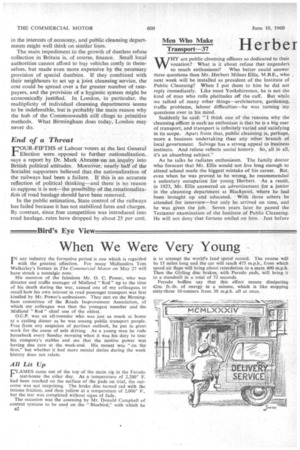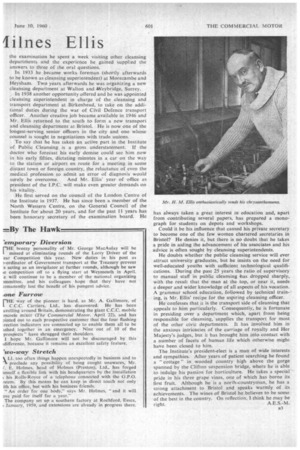Herber Tithes Ellis
Page 36

Page 37

If you've noticed an error in this article please click here to report it so we can fix it.
WHY are public cleansing officers so dedicated to their vocation? What is it about refuse that engenders so much enthusiasm? Who better could answer these questions than Mr. Herbert Milnes Ellis, M.B.E., who next .week will be installed as president of the Institute of Public Cleansing? When I put them to him he did nOt reply immediately. Like most Yorkshiremen, he is not the kind of man who rolls platitudes off the cuff. But while we talked of many other things—architecture, gardening, traffic problems, labour difficulties—he was turning my
questions over in his mind. .
Suddenly he said: "I think one of the reasons why the cleansing officer is such an enthusiast is that he is a big user of transport, and transport is infinitely varied and satisfying in its scope. Apart from that, public cleansing is, perhaps, more a business undertaking than any other branch of local government. Salvage has a strong appeal to business instincts. And refuse reflects social history. So, all in all, it's an absorbing subject."
As he talks he radiates enthusiasm. The family doctor who forecast that Mr. Ellis would not live long enough to attend school made the biggest mistake of his career. But, even when he was proved to be wrong, he recommended a sedentary occupation for young Herbert. As a result, in 1923, Mr. Ellis answered in advertisement for a junior in the cleansing department at Blackpool, where he had been brought up and educated. With three others he attended for interview—but only he arrived on time, and he was given the job. Seven years later he passed the Testamur examination of the Institute of Public Cleansing. He will not deny that fortune smiled on him. Just before
the examination he spent a week visiting other cleansing departments and the experience he gained supplied the answers to three of the oral questions.
In 1933 he became works foreman (shortly afterwards to be known as cleansing superintendent) at Morecambe and Heysham. Two years afterwards he was organizing a new cleansing department at Walton and iNeybridge, Surrey.
In 1938 another opportunity offered and he was appointed cleansing superintendent in charge of the cleansing and transport department at Birkenhead, to take on the additional duties during the war of Civil Defence transport officer. Another creative job became available in 1946 and Mr.. Ellis returned to the south to form a new transport and cleansing department at Bristol. He is now one of the longest-serving senior officers in the city and one whose counsel is sought in negotiations with trade unions.
To say that he has taken an active part in the Institute of Public Cleansing is a gross understatement. If the doctor who forecast his early demise could see him now in his early fifties, dictating minutes in a car on the way to the station or airport en route for a meeting in some distant town or foreign country, the reluctance of even the medical profession to admit an error of diagnosis would surely be overcome. And Mr. Ellis' year of office as president of the I.P.C. will make even greater demands on his vitality.
He first served on the council of the London Centre of the Institute in 1937. He has since been a member of the North Western Centre, on the General Council of the Institute for about 20 years, and for the past 11 years has been honorary secretary of the examination board. He has always taken a great interest in education and, apart from contributing several papers, has prepared a monograph for students on depots and workshops.
Could it be his influence that caused his private secretary to become one of the few women chartered secretaries in Bristol? He denies it, but there is no doubt that he takes a pride in aiding the advancement of his associates and his advice is often sought by cleansing superintendents.
He doubts whether the public cleansing service will ever attract university graduates, but he insists on the need for well-educated youths with sufficient technological qualifications. During the past 25 years the ratio of supervisory to manual staff in public cleansing tas dropped sharply, with the result that the man at the top, or near it, needs a deeper and wider knowledge of all aspects of his vocation. A grammar school education, followed by technical training, is Mr. Ellis' recipe for the aspiring cleansing officer.
He confesses that it is the transport side of cleansing that appeals to him particularly. Consequently, he is fortunate in presiding over a department which, apart from being responsible for cleansing, supplies the transport for most of the other civic departments. It has involved him in the anxious intricacies of the carriage of royalty and Her Majesty's judges, but it has brought him into contact with a number of facets of human life which otherwise might have been closed to him.
The Institute's president-elect is a man of wide interests and sympathies. After years of patient searching he found a " cottage " in wooded country high above the gorge spanned by the Clifton suspension bridge, where he is able to indulge his passion for horticulture. He takes a special pride in his three grape vines, one of which has borne its first fruit. Although he is a north-countryman, he has a strong attachment to Bristol and speaks warmly of its achievements.. The wines of Bristol he believes to be some of the best in the country. On reflection, I think he may be rieht. A.E.S.-M.




















































































































































